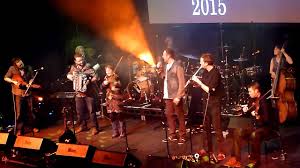
I have had the good fortune to listen to a lot of reggae through my life.
In fact, it’s been one of my ‘constant’ genres of choice, since I went to my first reggae gig at 6 years old. Others genres come and go, but reggae remains, always uplifting, always taking me to a place of ease and always delivering those fat, lazy, deeply pleasing bass lines… lines that your average Joe (non bass player) could sing to you, they are so ‘sunk into’ our shared musical culture. These lines create the ‘feel’ that is absolutely integral to the reggae / rocksteady sound.
Imagine my surprise then, when the Gaelic supergroup Daimh requested a very well known reggae riff, to be played along with a Gaelic song called Oran na Cloiche.
I guess, as it might for many bass players, this challenged me. Not in terms of the actual playing (I was well up for grooving that collection of notes, in that order), but in terms of the sense that we might be ‘cheesin’ it up’; that we might somehow be misusing someone else’s musical heritage, misappropriating an iconic riff (for comedy purposes?).
Heritage is really important in these parts (West Highlands of Scotland). I’m still on a journey of understanding around the attitudes in traditional music, which can mean that certain things are simply not accepted, because they differ from what’s gone before. And then, you find other things that are a total goer, when you wouldn’t think they would be, like this incredible beat-box-meets-gaelic-rap scenario, featuring 16 year old Lewis MacRae:

So, did I ‘Stir it Up’?, I hear you ask. Well, yes. Yes I did.
But only after I’d had a brilliant lyric-related realisation, thanks to Kathleen MacKinnes’ translation of Oran na Cloiche. It turns out that it’s all about a stone that has been taken from Scotland and is being returned (could it be the Stone of Destiny, stolen from Scotland in 1296 by the English, and stolen back as recently as 1950?):
A’ Chlach a bha mo sheanmhair
‘S mo sheanair oirre seanchas
Air tilleadh mar a dh’fhalbh i
Mo ghalghad a’ Chlach
‘S gur coma leam i ‘n Cearrara
An Calasraid no ‘n Calbhaigh
Cho fad’ ‘s a tha i ‘n Albainn
Nan garbhlaichean cas
The Stone that my grandmother
And grandfather used to talk about
Has returned as it left
My brave Stone
And I don’t care whether it’s in Kerrera
Callendar or Calvay
As long as it’s in
Steep, rugged Scotland
That made me think of the great Bob Marley song ‘Cornerstone’ (“The stone that the builder refuse, will always be the headcorner stone”), which advises us to overcome our aversions:
“…the things people refuse
are the things they should use
do you hear me?
hear what I say”
Given that advice, I figured Bob, Pete and Bunny (and either Aston ‘Family Man’ Barratt, or Robbie Shakespeare – the two bassists on the Catch a Fire album) – probably wouldn’t have minded that much. That’s my excuse, anyway.
